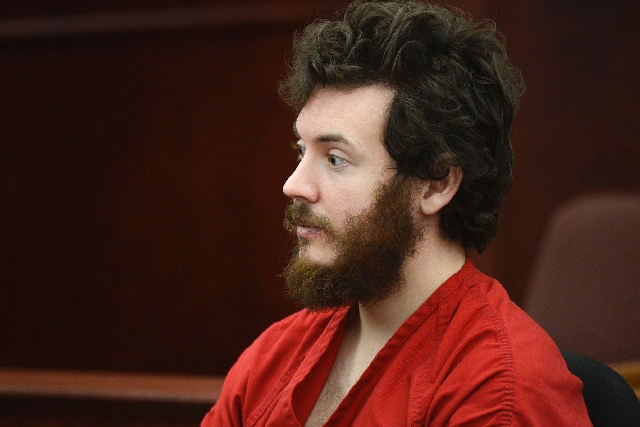Judge delays decision on Holmes insanity plea

CENTENNIAL, Colo. — Lawyers for the Colorado theater shooting suspect told a judge Monday he wants to change his plea to not guilty by reason of insanity, but the judge won’t immediately rule on whether to allow it.
Attorney Daniel King made the request in court, saying the defense now has a diagnosis for James Holmes, though he didn’t specify what it was.
Holmes, with bushy hair and beard, didn’t speak during the hearing after entering the courtroom with his eyes downcast.
Before deciding whether to accept a new plea, Judge Carlos Samour said, he would consider arguments about constitutional questions the defense has raised about Colorado’s insanity and death penalty laws.
He isn’t expected to announce his decision until May 31, when another hearing is scheduled.
At the heart of the dispute is a list of cautions Samour has prepared advising Holmes of the ground rules of an insanity defense.
It includes an advisory that Holmes must cooperate with doctors during a mandatory mental health evaluation or he won’t be able to present mitigating evidence about his mental state if he is convicted and a jury considers whether he should be executed. Just how much cooperation is required hasn’t been tested in court since the laws were changed in the late 1990s.
A not guilty by reason of insanity plea is widely seen as Holmes’ best hope – perhaps his only hope – of avoiding the death penalty. But his lawyers have held off until now, fearing a wrinkle in the law could cripple their ability to raise his mental health as a mitigating factor during the sentencing phase.
Two judges, including Samour, have previously refused to rule on the constitutionality of the law, saying the attorneys’ objections were hypothetical because Holmes had not pleaded insanity. The defense had little choice but to have Holmes enter the plea and then challenge the law.
Holmes’ lawyers announced last week that Holmes would ask to change his plea at the hearing.
Prosecutors are seeking the death penalty. They say Holmes, a former neuroscience graduate student, spent months acquiring weapons and ammunition, scouting a theater in the Denver suburb of Aurora and booby-trapping his apartment.
Then on July 20, dressed in a police-style helmet and body armor, he opened fire during a packed midnight showing of “The Dark Knight Rises,” prosecutors say. Twelve people died and 70 were injured.
No motive has emerged in nearly 10 months of hearings, but Holmes’ attorneys have repeatedly said their client is mentally ill. He was being treated by a psychiatrist before the attack.
The insanity plea carries risks for both sides. Holmes will have to submit to the mental evaluation by state-employed doctors, and prosecutors could use the findings against him.
“It’s literally a life-and-death situation with the government seeking to execute him and the government, the same government, evaluating him with regard to whether he was sane or insane at the time he was in that movie theater,” said attorney Dan Recht, a past president of the Colorado Criminal Defense Bar.
Among the risks for prosecutors: They must convince jurors beyond a reasonable doubt that Holmes was sane. If they don’t, state law requires the jury to find him not guilty by reason of insanity.
“That’s a significant burden on the prosecution,” Recht said.
If acquitted, Holmes would be committed to the state mental hospital indefinitely.
A judge entered a standard not guilty plea on Holmes’ behalf in March, and he needs court permission to change it.
The mental evaluation could take weeks or months. Evaluators would interview Holmes, his friends and family, and if Holmes permits it, they’ll also speak with mental health professionals who treated him in the past, said Dr. Howard Zonana, a professor of psychiatry and adjunct professor of law at Yale University.
Evaluators may give Holmes standardized personality tests and compare his results to those of people with documented mental illness. They will also look for any physical brain problems.
Zonana estimates he has conducted around 200 mental evaluations of criminal defendants, including some death penalty cases.
“All cases are tough,” he said.
Meticulous planning, as in the scenario prosecutors laid out against Holmes, doesn’t necessarily mean a defendant is sane, Zonana said.












